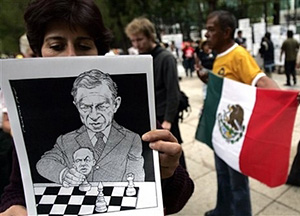 |
 |
 |
 Editorials | Issues | March 2007 Editorials | Issues | March 2007  
Strained Ties With Mexico Flare Up
 James C. McKinley Jr. - NYTimes James C. McKinley Jr. - NYTimes


| | A woman holds a drawing depicting U.S. President Bush using Mexico's President Felipe Calderon to play chess during a protest against Bush's visit to Mexico in front of the U.S. Embassy in Mexico City Monday March 12, 2007. (AP/Eduardo Verdugo) |
Merida, Mexico — Just a few days before President Bush was scheduled to land here on Monday for bilateral talks, the Mexican Foreign Ministry sent an angry diplomatic note to the United States for a matter so trifling it was almost comical.

The note complained that U.S. Border Patrol agents had crossed the border and ventured a couple of dozen feet into Mexico to put out a rapidly spreading brush fire. "Even in emergency situations, the Mexican authorities must be notified immediately, without exception," the note said.

The incident illustrates just how touchy relations have become between the United States and Mexico during Bush's presidency and hints at the difficulty the American president faces as he tries on this state visit to revive what many Mexicans see as a moribund partnership.

In large measure, the relationship has stagnated in recent years as Bush has failed to deliver on a promise of a change in immigration laws to allow more guest workers while conservatives in his party have pushed through tougher measures to control the border, among them a giant wall. Anti-American sentiment runs high here, with more than half of 1,000 people surveyed in a recent BBC poll saying they viewed the United States' influence in the world as mainly negative. The margin of error was 2.8 percent.

"A lot of what my president will be looking for in Merida is a renewed sense of purpose," said one high-ranking Mexican diplomat.

For the United States, there is more at stake in the talks with President Felipe Calderon, a conservative free-trade advocate, than possible progress on an age-old list of frictions between the two neighbors: drug trafficking, trade barriers, border security, and illegal migration.

Also in play is whether Calderon is willing or able to become a pro-American counterweight to Hugo Chavez, the left-wing populist leader of Venezuela who is using his country's oil wealth to undermine American influence in Latin America.

For political reasons, however, Calderon has been reluctant to become the anti-Chavez standard-bearer in public. He said in a recent interview with The Associated Press, "I am not interested in playing a role with Bush in that respect."

His aides say he wants to mend fences with the United States' antagonists, Cuba and Venezuela, as well as the rest of Latin America. "The United States has a lot to do to regain respect in Latin America," he said.

Still, Calderon remains the best candidate the United States has for a strong ally in Latin America these days. Gordon D. Johndroe, the spokesman for the National Security Council, said the main purpose of Bush's visit to Mexico was "to show support and confidence in the agenda that President Calderon has laid out."

"He's certainly an important regional leader who is making the right policy choices," Johndroe said.

One trouble for Bush is that he is a lame-duck president facing an opposition-controlled Congress. He seems to have little to offer Calderon beyond a handshake and a photo in front of Mayan ruins, political analysts say.

The Mexican president would dearly love to see a comprehensive immigration bill passed that would allow more migrants to work temporarily in the United States and would offer citizenship to many of the 6.4 million undocumented workers already there. It is unlikely that Bush can deliver on that now, given the divisions within his own party.

Bush has said he still believes he can push an immigration bill through Congress, working with both parties.

Mexicans had high hopes of a better relationship when Bush, a former Texas governor, was elected in 2000, as he promised to push through an immigration-reform bill.

But those initial hopes have soured over the last six years. Bush and the U.S. Congress not only refused to do anything to legalize millions of undocumented Mexicans, but took strong actions after the Sept. 11, 2001, attacks to strengthen security along the 2,000-mile border. The result has been more walls and barriers. | 
 | |
 |



